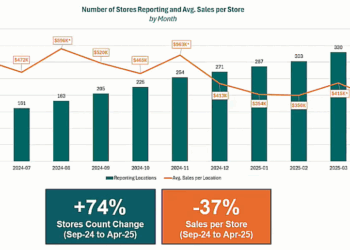A federal court recently hit a defendant in the Eaze fraud case with an adjusted $17 million fine for his role in a scheme to trick credit card companies into processing electronic payments for cannabis, potentially further chilling the credit industry’s willingness to take part in pot purchases.
Three years ago, consultants Hamid Akhavan and Ruben Weigand were found guilty of defrauding banks in order to help Eaze process electronic payments for cannabis deliveries. Credit card companies and major banks have typically shied away from allowing their cards to be used for cannabis, so sometimes dispensaries may attempt to disguise those purchases by billing them as something unrelated, or by rounding up the purchase amount to the nearest $10 or $20 so that the transaction appears like an ATM withdrawal.
“The whole thing about Eaze is they were making up pet food companies and pool supply companies and defrauding Visa and MasterCard, and that’s why they cracked down hard on them,” said Paul Dunford, co-founder and VP of Knowledge at Green Check, a cannabis financial services company. “I think that’s had a little bit of a follow-on effect with MasterCard really recently coming out strong against cashless ATMs.”
Last summer, MasterCard ordered financial institutions to stop allowing MasterCard-backed debit cards to be used in cannabis purchases. Visa also previously warned against such practices.
On Jan. 29, a federal judge in the Southern U.S. District Court increased Akhavan’s $100,000 penalty to $17 million. Akhavan’s previous fine was the legal limit for his fraud charge. But the Second Circuit Court of Appeals overruled the amount and ordered the lower court to evaluate the sentence while considering that he made $17 million through his scheme and that despite no actual loss to the banks, he still put them at risk.
“Akhavan’s limited focus on economic harm obfuscates the harm that his conduct did cause, namely tricking banks into processing $156 million of transactions that propagated the unlawful distribution of a controlled substance,” wrote District Judge Jed Rakoff, in the 17-page sentencing order.
Technically, Akhavan will only be obligated to pay at a rate of 5% of his gross monthly income to eliminate any chance that the forfeiture would “deprive Akhavan of his livelihood.”
Despite the payment cap, the large figure and the fact that this case put a spotlight on fraudulent cannabis transactions could compel financial institutions to keep a closer eye on the transactions on their network.
“I think some people think it’s a victimless crime, but you are defrauding these credit card companies. No matter how we feel about the credit card companies, fraud is a big-deal crime. That’s what puts white collar criminals in prison,” said Dunford. “The people who are playing fast and loose are punishing everyone else in the industry. If MasterCard wasn’t called to court in California, would they perhaps be more willing to allow folks to use their networks?”
Despite a cannabis operator’s best intentions, there are variable levels of compliance scrutiny along the financial supply chain, according to attorney Max Riffin, partner at Prince Lobel Tye.
“Most folks in the cannabis industry are trying to do things the right way when it comes to deploying payment processing solutions,” said Riffin in an email. “But the news earlier this month is a reminder to the cannabis space: Double- and triple-check that your payment solution is compliant and following network rules, whether point of banking, ACH transfers, etc. But, to date, credit card processors are clearly not an available option in the cannabis space.”
Riffin also noted that he was aware of efforts to find legal solutions for electronic cannabis payments.
“I have at least one cannabis-focused Fintech client that believes it has a cutting edge compliant payment processing solution, and I’m aware of others out there working on focusing their efforts on accomplishing the same,” said Riffin. “So, we shall see.”













